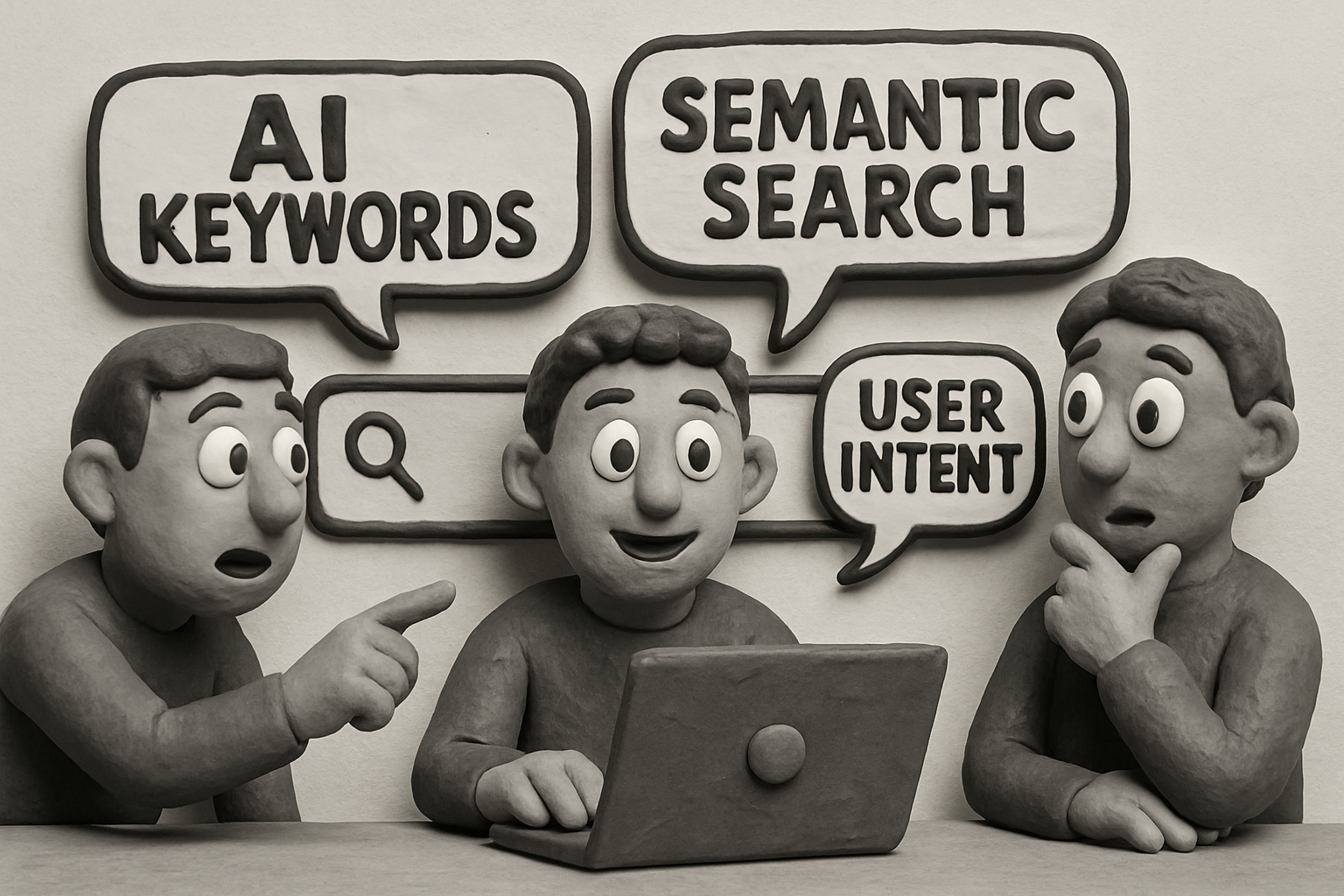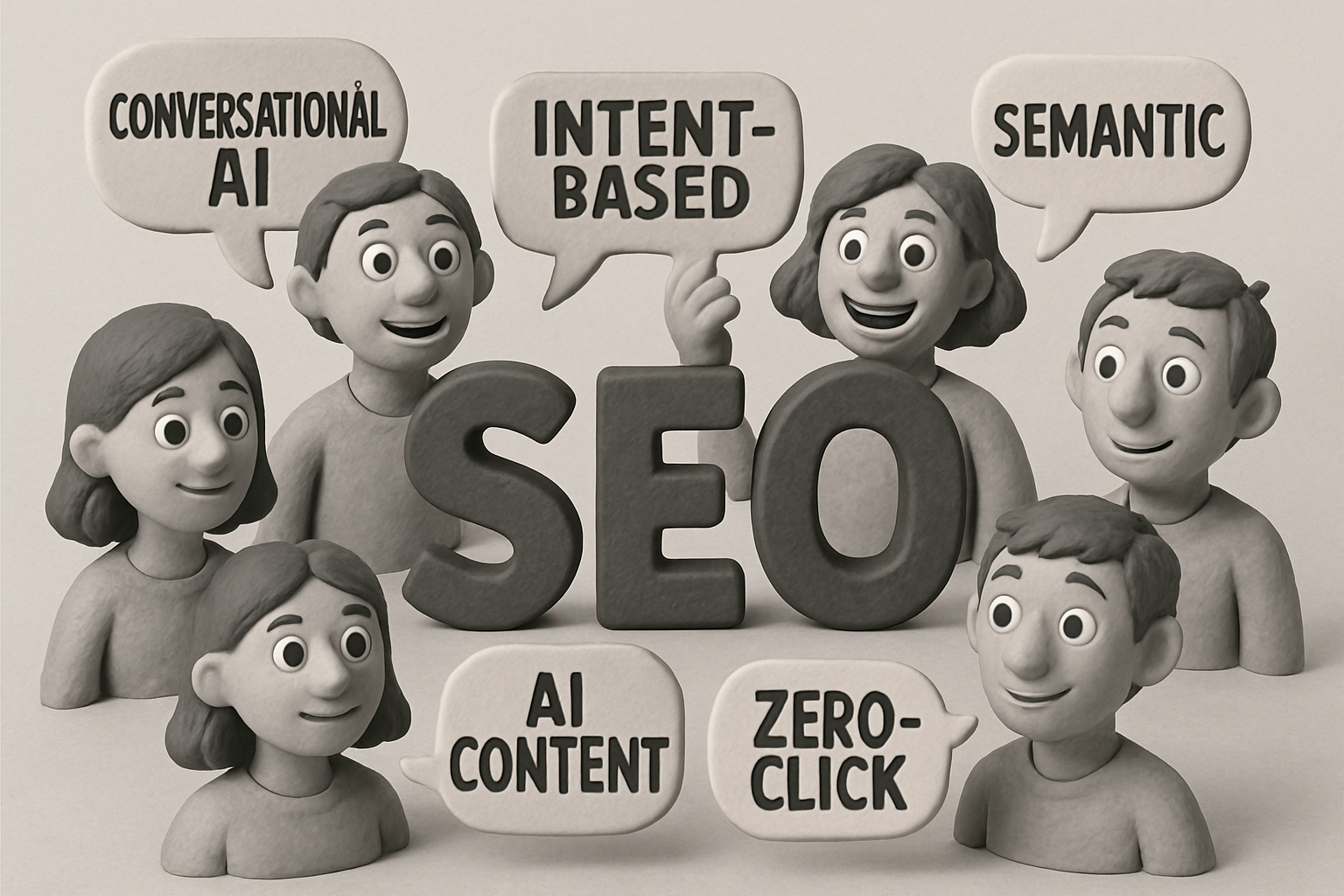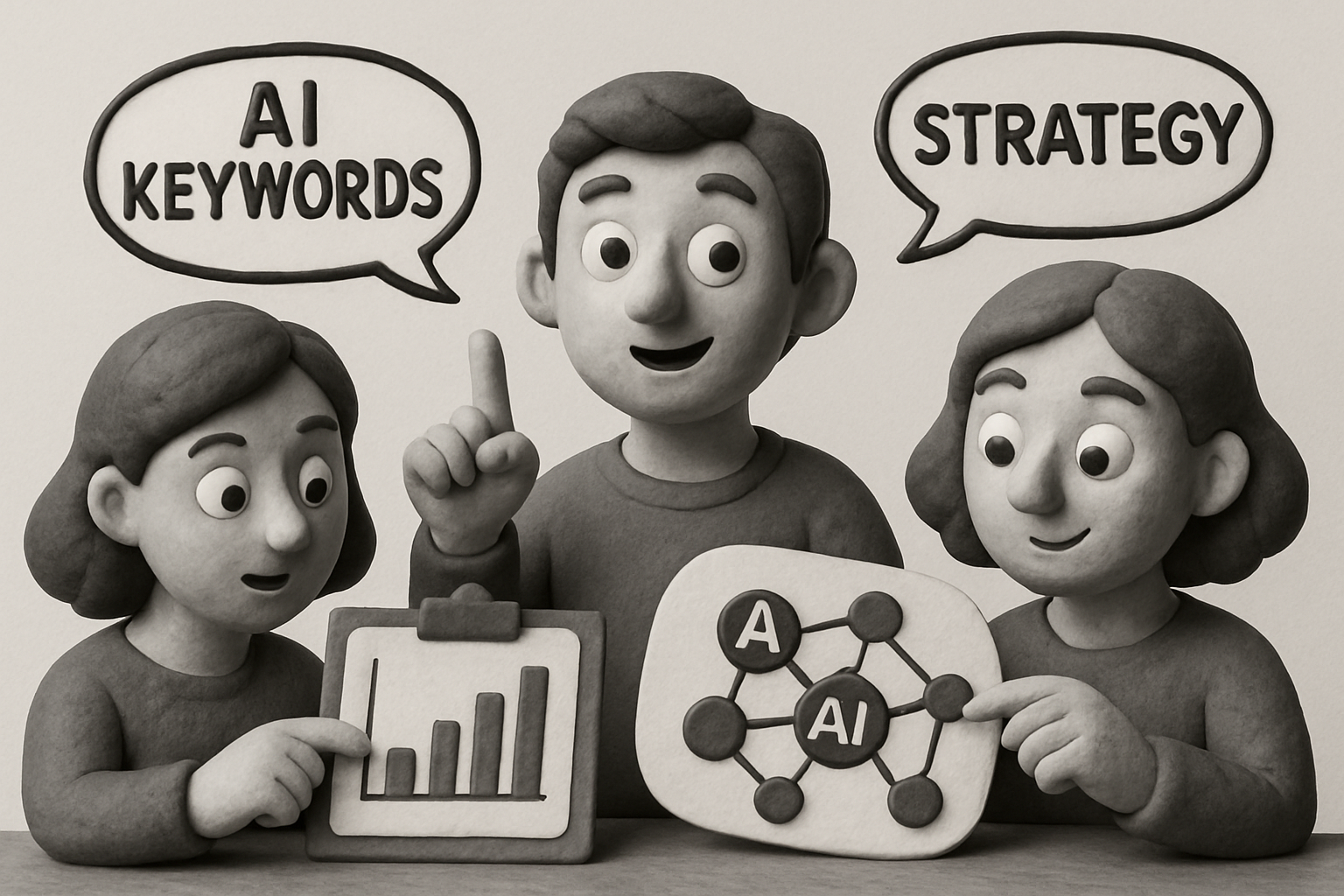The AI-driven SEO revolution is here—reshaping how brands reach the top of search results faster than ever before. In 2025, mastering ai keywords isn’t just a smart move; it’s essential for staying ahead of the competition and fueling sustainable organic growth.
This article reveals the 7 essential ai keywords you need to boost your SEO, why each one matters, and how to seamlessly weave them into your strategy. Ready to future-proof your rankings and unlock actionable insights? Let’s dive in and transform your SEO approach for the AI era.
The Importance of AI Keywords in Modern SEO
The landscape of SEO is rapidly evolving, and at the center of this transformation are ai keywords. Unlike traditional keyword strategies, ai keywords are reshaping how search engines interpret, rank, and deliver results to users. Understanding their growing importance is crucial for anyone looking to stay ahead in the digital race.

What Are AI Keywords?
Ai keywords are keyword phrases specifically crafted to align with how artificial intelligence interprets search intent. Unlike the legacy approach of targeting exact-match or broad-match phrases, ai keywords are designed for semantic richness and contextual relevance. For example, instead of optimizing for "buy shoes," an ai keyword might be "best lightweight running shoes for flat feet."
The difference lies in sophistication—ai keywords consider user intent, context, and relationships between words. With the rise of intent-based and semantic search, these keywords allow brands to resonate with search engines that now "think" more like humans. Search engines prioritize ai keywords because they help surface results that are genuinely useful, not just those stuffed with popular terms.
How AI Is Changing Search Algorithms
AI is fundamentally rewriting the rules of search. Google's RankBrain, BERT, and MUM updates are prime examples of how machine learning now deciphers search queries with unprecedented accuracy. These advancements allow search engines to understand conversational and long-tail queries—areas where ai keywords thrive.
Instead of focusing solely on individual words, algorithms now analyze the meaning behind a query. This has led to a surge in long-tail and conversational keyword strategies. After a recent AI update, one site saw its ranking improve by 30% simply by updating content to match intent-driven ai keywords. For a deeper dive into these changes, check out How AI ranks content.
Why AI Keywords Are Critical for 2025
Looking ahead, the influence of ai keywords on SEO will only intensify. As more searches become powered by AI, the focus is shifting from keyword stuffing to context-driven optimization. Recent data shows a double-digit increase in AI-powered search queries year-over-year.
What makes ai keywords essential is their alignment with user intent and personalization. Search engines now adapt results to individual users, making it critical to optimize for keywords that reflect context and intent. Early adopters of ai keywords will hold a clear competitive edge as the digital landscape continues to evolve.
Common Mistakes When Targeting AI Keywords
Despite their potential, many marketers misuse ai keywords. A common mistake is relying too heavily on outdated keyword tools that ignore semantic relationships and topical clusters. Others fail to update their content for AI-driven search intent, missing out on relevance and visibility.
Neglecting ongoing analysis is another pitfall. Ai keywords require regular review as search trends shift. Keyword misuse—such as forcing terms where they don't fit—often leads to lost ranking opportunities. To succeed, brands must approach ai keywords as a living, adaptive part of their SEO strategy.
7 Essential AI Keywords to Boost Your SEO in 2025
In 2025, the race for top search rankings is all about understanding—and using—the right ai keywords. As search engines become more sophisticated, simply picking obvious phrases is no longer enough. You need to know what types of ai keywords matter, why they work, and how to integrate them seamlessly into your content strategy.
Below, discover the seven essential ai keywords that will define SEO success in the coming year. For each, you’ll find clear explanations, practical examples, and actionable tips to help you future-proof your SEO approach.

1. Conversational AI
Conversational AI keywords are designed to mimic the natural, flowing language people use when they speak. Unlike rigid, short-tail keywords, these phrases capture how real users interact with devices, especially through voice search or AI chatbots.
For example, instead of typing "weather New York," a user might ask, "What’s the weather like in New York today?" This shift is significant—conversational queries grew by over 30% in 2024, according to industry reports. Voice assistants and AI chatbots thrive on these natural phrases, making them a must for modern SEO.
To optimize for conversational ai keywords:
- Add FAQ sections to your website.
- Use question-based headers and answers.
- Write in a tone that mirrors spoken language.
Tools like Google's People Also Ask and Answer the Public help identify these keywords. But be careful: avoid making your content too robotic or repetitive. Instead, focus on genuinely helpful, human-centered responses. For more on aligning your strategy, see these AI SEO strategies and trends.
2. Intent-Based Search
Intent-based search revolves around understanding what users really want when they type a query. Ai keywords in this category reflect different goals—whether someone is seeking information, looking to buy, or just browsing.
For instance:
- Informational: "How to clean white sneakers"
- Transactional: "Buy running shoes online"
- Commercial: "Best laptop for students"
- Navigational: "Nike store near me"
AI-powered search engines now prioritize intent over exact match keywords. In 2024–2025, over 60% of queries were driven by clear user intent. To win, map your content to each intent type. Use tools like SEMrush and Ahrefs to analyze intent and structure content accordingly.
A common pitfall is misreading intent—don’t stuff a product page with informational ai keywords or vice versa. Instead, align every page with the user journey and provide direct, relevant answers to their needs.
3. Semantic SEO
Semantic SEO focuses on the meaning behind words, not just their presence. Ai keywords here are all about context and relationships—search engines want to understand topics, not just terms.
For example, if you’re targeting "digital marketing," related semantic keywords might include "content strategy," "SEO tools," or "lead generation." Organizing your content into topic clusters helps search engines see your site as an authority.
Semantic ai keywords drive results:
- Higher chances of appearing in featured snippets
- More visibility in People Also Ask boxes
Use tools like Clearscope or MarketMuse to find semantic relationships and build out content clusters. Structure articles with clear headings and supporting subtopics. Avoid keyword cannibalization—make sure each page has a unique focus.
4. Long-Tail AI Keywords
Long-tail ai keywords are highly specific phrases with lower competition but higher conversion rates. They target users who know exactly what they want, like "affordable AI-powered SEO tools for small businesses."
AI-driven tools can now surface long-tail opportunities by analyzing massive datasets and user behaviors. According to studies, long-tail keywords convert up to 3x better than short, generic terms.
How to find and use them:
- Use keyword research platforms with AI capabilities.
- Review search console data for specific user queries.
- Create content that answers niche questions.
A real-world example: A SaaS company targeted long-tail ai keywords related to "project management software for remote teams" and saw a 40% boost in qualified organic leads. The key? Consistent, targeted content that matches the long-tail intent.
5. Personalized Search Queries
Personalized search queries are tailored to the individual—think location, device, or even past behavior. Ai keywords in this realm let you reach users with content that feels custom-made for them.
Examples include:
- "Best pizza near me"
- "Deals on flights from Boston"
- "Running shoes for women over 50"
AI now powers personalization at scale. In 2024, over 50% of search results were influenced by personalization factors. To leverage this, segment your keyword research by audience demographics and local intent.
Use Google Trends, local SEO tools, and analytics platforms to identify and target personalized ai keywords. Always consider privacy—be transparent about data usage and focus on delivering value without being intrusive.
6. AI-Generated Content Optimization
With the rise of AI-generated content, optimizing for ai keywords means ensuring that both human and machine-created copy aligns with search intent. Natural language generation tools can suggest blog topics, meta descriptions, and even full articles.
Example: An AI platform generates a listicle on "top AI SEO tools for marketers," automatically weaving in high-impact ai keywords. Adoption of AI content tools in SEO workflows jumped by 45% in the last year.
Tips for success:
- Review and edit AI-generated content to ensure accuracy.
- Align generated content with your keyword strategy.
- Use platforms like Jasper or Copy.ai, but always add a human touch.
Be mindful of ethical considerations—disclose AI involvement where appropriate and avoid over-automation that can dilute your brand’s voice.
7. Zero-Click Search Keywords
Zero-click search keywords are those that trigger instant answers on the search results page—think featured snippets, knowledge panels, or quick calculators. Users get the info they need without clicking through to a website.
Examples:
- "Weather today"
- "SEO definition"
- "Time in Tokyo"
In 2025, over 65% of Google searches are expected to be zero-click, powered by AI’s ability to parse and display concise answers. To optimize for these ai keywords:
- Structure content with clear, direct answers.
- Use schema markup (FAQ, HowTo) to help search engines.
- Monitor which queries trigger zero-click results using tools like SEMrush.
Balancing visibility and traffic is key—while you may get fewer clicks, your brand authority and impressions can soar with the right strategy.
How to Research and Identify AI Keywords for Your Niche
Unlocking the full potential of your SEO in 2025 starts with a razor-sharp approach to researching and identifying ai keywords that resonate with both users and search engines.
The process isn’t just about finding words—it’s about understanding intent, context, and the evolving landscape of AI-powered search. Let’s break down the most effective strategies you can use to pinpoint high-impact ai keywords for your unique niche.

Leveraging AI-Powered Keyword Tools
Today’s leading AI-powered keyword research platforms are redefining how marketers approach ai keywords. These tools go far beyond basic volume and competition data.
They use machine learning to analyze user intent, map out semantic relationships, and uncover hidden opportunities. For example, platforms like Semrush and Ahrefs now use AI-driven features to suggest not just keywords, but full topic clusters and content gaps.
Key features to look for include:
- Intent analysis for matching content to searcher goals.
- Semantic mapping to reveal connections between ai keywords and related topics.
- Competitor insights to identify missed opportunities.
By streamlining discovery and surfacing actionable data, these platforms can drastically improve your workflow. For hands-on tips, check out these AI-powered content generation tips to further optimize your keyword process.
Analyzing Competitor Keyword Strategies
Understanding how your competitors leverage ai keywords can give you the edge needed to outrank them. Start by identifying who dominates your niche and reverse-engineer their strategies.
Use tools like SpyFu, Moz, or SEMrush’s competitive analysis modules to:
- Uncover the ai keywords driving top-performing pages.
- Spot keyword gaps where competitors rank and you don’t.
- Benchmark your keyword coverage against industry leaders.
Look for patterns in how they structure content, use intent-driven keywords, and create topic clusters. This benchmarking not only highlights opportunities but also helps you avoid pitfalls like targeting outdated or irrelevant ai keywords.
Mapping Keywords to Content Clusters
Building topical authority is crucial when working with ai keywords. Instead of isolating keywords, group them into clusters around core themes.
For example, create a pillar page targeting a broad ai keywords topic, then link out to supporting articles covering subtopics or related questions. This structure signals expertise to search engines and enhances the user experience.
To organize clusters efficiently:
- Use mind-mapping tools or spreadsheets.
- Identify pillar topics and map related ai keywords beneath them.
- Regularly update clusters as search trends shift.
Well-structured content clusters often lead to higher rankings and greater visibility, as search engines understand your site’s relevance and depth.
Monitoring and Updating Your AI Keyword Strategy
Staying ahead in the world of ai keywords means ongoing analysis and adaptation. Track keyword performance using analytics platforms like Google Search Console, SEMrush, or Ahrefs.
Monitor shifts in rankings, organic traffic, and SERP features. Regularly refresh your content to align with evolving AI search intent and new keyword opportunities.
Avoid the trap of keyword stuffing, which can hurt rankings—review these tips on avoiding keyword stuffing mistakes to keep your optimization natural and effective.
Top-ranking sites update their ai keywords strategy frequently, ensuring their content stays relevant and competitive in the rapidly shifting SEO landscape.
Integrating AI Keywords into Your SEO Workflow
Integrating ai keywords into your SEO workflow is the secret sauce for staying ahead in 2025. Whether you’re optimizing on-page elements or revamping your technical setup, a strategic approach to these keywords ensures you’re speaking the same language as both search engines and users. Let’s break down how you can seamlessly weave ai keywords into every stage of your SEO process.

On-Page Optimization for AI Keywords
When it comes to on-page optimization, ai keywords should be integrated naturally into your titles, headers, and body text. Focus on context and semantic relevance—avoid stuffing keywords, as this can hurt readability and rankings.
Consider using lists or tables to break up content and highlight key points. For example:
| Element | Best Practice |
|---|---|
| Title | Place ai keywords early |
| Headers (H1-H3) | Use variations and semantic connections |
| Body Text | Integrate naturally within answers and insights |
Optimizing for conversational queries is especially important as AI chatbots and voice assistants shift how users interact with search engines. For more on this trend, see AI Chatbots Transforming Search Behavior.
Content Creation and AI Keyword Alignment
Aligning your content topics with ai keywords starts with robust keyword research. Use AI-driven tools to generate blog post ideas, outlines, and even meta descriptions that reflect the latest search trends.
Short, focused content blocks help readers and search engines alike. For example, FAQs and how-to guides are perfect for targeting long-tail ai keywords.
- Generate content briefs using AI tools
- Map each piece to a specific user intent
- Review outlines for natural keyword placement
A consistent editorial process ensures every new page is optimized for both human readers and AI-powered search algorithms.
Technical SEO Considerations
Technical SEO is where ai keywords can make a huge impact on visibility. Incorporate structured data—like FAQ and HowTo schema—to help search engines understand your content’s context.
Internal linking should reinforce topic clusters built around your primary ai keywords. Use tools to audit your site structure and identify gaps.
For a deeper dive into optimizing for AI-driven search engines, explore Generative Engine Optimization Explained.
Measuring Performance and ROI
Tracking the effectiveness of your ai keywords is crucial for ongoing improvement. Focus on KPIs such as organic traffic, SERP position changes, and click-through rates.
Use analytics platforms to monitor keyword rankings and user engagement. Set up dashboards to visualize performance over time and spot new opportunities.
Iterative optimization is key—regularly update your strategy based on data insights to maximize your ROI and maintain your competitive edge.
Now that you know which AI keywords will shape SEO in 2025, it’s your move. We’ve covered practical ways to find, use, and benefit from these essential keywords—but having the right tools can make all the difference. If you’re ready to simplify your content creation and stay ahead of the competition, why not give RankPill a try? Their AI-powered platform takes the guesswork out of keyword research and content planning, so you can focus on growing your traffic and hitting your goals. Ready to put these insights into action?
Get Started